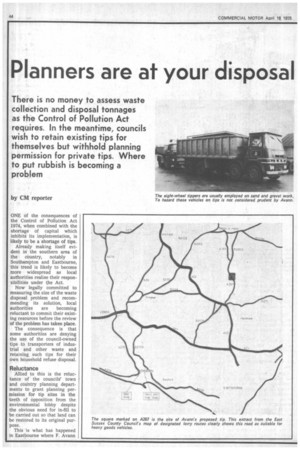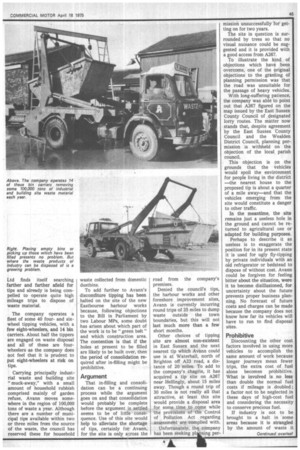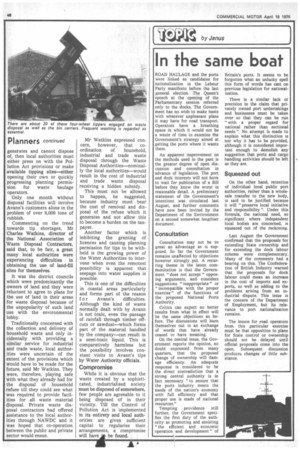Planners are at your disposal
Page 46

Page 47

Page 48

If you've noticed an error in this article please click here to report it so we can fix it.
There is no money to assess waste collection and disposal tonnages as the Control of Pollution Act requires. In the meantime, councils wish to retain existing tips for themselves but withhold planning permission for private tips. Where to put rubbish is becoming a problem
by CM reporter
ONE of the consequences of the Control of Pollution Act 1974, when combined with the shortage of capital which inhibits its implementation, is likely to be a shortage of tips.
Already making itself evident in the southern area of the country, notably in Southampton and Eastbourne, this trend is likely to become more widespread as local authorities realise their responsibilities under the Act.
Now legally committed to measuring the size of the waste disposal problem and recommending its solution, local authorities are becoming reluctant to commit their existing resources before the review of the problem has taken place.
The consequence is that some authorities are denying the use of the council-owned tips to transporters of industrial and other waste and retaining such tips for their own household refuse disposal.
Reluctance
Allied to this is the reluctance of the councils' town and country planning departments to grant planning permission for tip sites in the teeth of opposition from the environmental lobby despite the obvious need for in-fill to be carried out so that land can be restored to its original purpose.
This is what has happened in Eastbourne where F. Avann Ltd finds itself searching farther and farther afield for tips and already is being compelled to operate quite high mileage trips to dispose of waste material.
The company operates a fleet of some 40 fourand sixwheel tipping vehicles, with a few eight-wheelers, and 14 bin carriers. About half the tippers are engaged on waste disposal and all of these are fourwheelers as the company does not feel that it is prudent to put eight-wheelers at risk on tips.
Carrying principally Indust-rial waste and building site "muck-away," with a small amount of household rubbish comprised mainly of garden refuse, Avann moves somewhere in the region of 100,000 tons of waste a year. Although there are a number of municipal tips available within two or three miles from the source of the waste, the council has reserved these for household waste collected from domestic dustbins.
To add further to Avann's discomfiture tipping has been halted on the site of the new Eastbourne harbour works because, following objections to the Bill in Parliament by two Labour MPs, some doubt has arisen about which part of the work is to be "green belt" and which construction area. The contention is that if the holes at present to be filled are likely to be built over, then the period of consolidation required after in-filling might be prohibitive.
Argument
That in-filling and consolidation can be a continuing process while the argument goes on and that consolidation would probably be complete before the argument is settled seems to be of little consequence. Use of this site would help to alleviate the shortage of tips, certainly for Avann, for the site is only a cross the road from the company's premises.
Denied the council's tips, the harbour works and other foreshore improvement sites, Avann is currently incurring round trips of 25 miles to dump waste outside the town boundaries, but this will not last much more than a few short months.
Other choices of tipping site are almost non-existent in East Sussex and the next nearest tip which Avann could use is at Waterhall, north of Brighton off A23 road, a distance of 20 miles. To add to the company's chagrin, it has acquired a tip site on A267 near Hellingly, about 15 miles away. Though a round trip of 30 miles is not really all that attractive, at least this site would provide a disposal area for some time to come while the provisions of the Control of Pollution Act regarding assessment are complied with.
Unfortunately, the company has been seeking plhing per i
A A
mission unsuccessfully for getting on for two years.
The site in question is surrounded by trees so that no visual nuisance could be suggested and it is provided with a good access from A267.
To illustrate the kind of objections which have been overcome, one of the original objections to the granting of planning permission was that the road was unsuitable for the passage of heavy vehicles. With long-suffering patience, the company was able to point out that A267 figured on the map issued by the East Sussex County Council of designated lorry routes. The matter now stands that, despite agreement by the East Sussex County Council and the Wealden District Council, planning permission is withheld on the objection of the local parish council.
This objection is on the grounds that the vehicles would spoil the environment for people living in the district —the nearest house to the proposed tip is about a quarter of a mile away—and that the vehicles emerging from the site would constitute a danger to other traffic.
In the meantime, the site remains just a useless hole in the ground and cannot be returned to agricultural use or adapted for building purposes.
Perhaps to describe it as useless is to exaggerate the position for in its present state it is used for ugly fly-tipping by private individuals with an old refrigerator or bedstead to dispose of without cost. Avann could be forgiven for feeling bitter about the situation, were it to become disillusioned, for uncertainty about the future prevents proper business planning. No forecast of future costs and charges can be made because the company does not know how far its vehicles will have to run to find disposal sites.
Prohibitive
Discounting the other cost factors involved in using more vehicles to accomplish the same amount of work because longer journeys mean fewer trips, the extra cost of fuel alone becomes prohibitive. What is involved is no less than double the normal fuel costs if mileage is doubled ; a factor not to be neglected in these days of high-cost fuel and considering the necessity to conserve precious fuel.
If industry is not to be brought to a halt in 'some areas because it is strangled by the amount of waste it generates and cannot dispose of, then local authorities must either press on with the Pollution Act provisions or make available tipping sites—either opening their own or quickly progressing planning permission for waste haulage operators.
Only one month without disposal facilities will involve Avann's customers alone in the problem of over 8,000 tons of rubbish.
Commenting on the trend towards tip shortages, Mr Charles Watkins, director of the National Association of Waste Disposal Contractors, said that, to be fair, a great many local authorities were experiencing difficulties in obtaining the use of land-fill sites for themselves, It was the district councils which were predominantly the owners of land and they were reluctant to agree to plans for the use of land in their areas for waste disposal because of the unpopularity of such land use with the environmental lobby.
Traditionally concerned with the collection and delivery of household waste and only incidentally with providing a similar service for industrial and trade waste, local authorities were uncertain of the extent of the provisions which would have to be made for the future, said Mr Watkins. They were, therefore, playing safe with what they already had for the disposal of household refuse till they could see what was required to provide facilities for all waste material disposal. Private waste dis. posal contractors had offered assistance to the local authorities through NAWDC and it was hoped that co-operation between the public and private sector would ensue. Mr Watkins expressed concern, however, that co ordination of household, industrial and trade waste disposal through the Waste Disposal Authorities—nominally the local authorities—would result in the cost of industrial and trade waste disposal receiving a hidden subsidy.
This must not he allowed to happen, he suggested, because industry must bear the cost of removal and disposal of the refuse which it generates and not allow this to become a burden on the taxpayer.
Another factor which is inhibiting the granting of licences and causing planning permission for tips to be withheld is the growing power of the Water Authorities to intervene when even the remotest possibility is apparent that seepage into water supplies is possible.
This is one of the difficulties in coastal areas particularly and forms part of the reason f o r Avann's difficulties. Although the kind of waste normally dealt with by Avann is not toxic, even the passage of rainfall through timber offcuts or sawdust—which forms part of the material handled by the company—can result in a semi-toxic liquid. This is comparatively harmless but the possibility involves constant visits to Avann's tips by Water Authority officials.
Compromise
While it is obvious that the waste created by a sophisticated, industrialised society must be disposed of somewhere, few people are agreeable to it being disposed of in their vicinity. Till the Control of Pollution Act is implemented in its entirety and local authorities are given sufficient capital to regularise their arrangements, a compromise will have be found.








































































































































